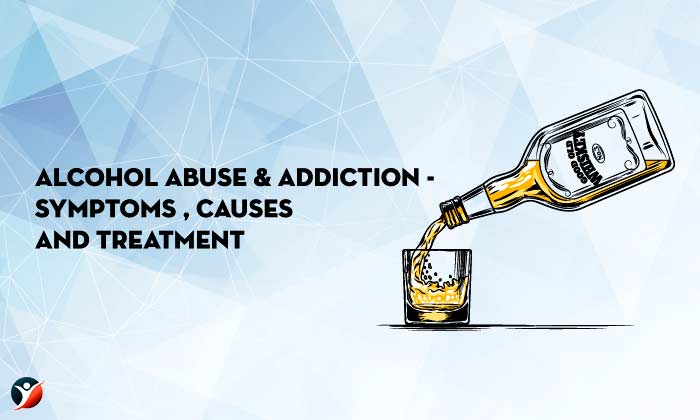
Everything You Should Know About Alcohol Abuse!

Introduction
For most people, moderate consumption of alcohol is generally not harmful. With regular alcohol abuse, you are not as such physically dependent, but you may still have a number of serious problems. People who abuse alcohol often tend to neglect responsibilities at school, work or other areas. It may also make you put yourself in certain dangerous situations or result in legal or social issues. However, around 18 million adult U.S. citizens have an alcohol use disorder (AUD). This indicates that their drinking habits lead to distress, health issues and harm. It includes alcohol abuse and alcoholism. Alcoholism, or what is commonly known as alcohol dependence, causes physical dependence, tolerance to alcohol (increased amount of alcohol is required to produce similar effects), alcohol cravings and loss of control over your drinking habits. Read on to know about symptoms, causes and treatments of alcohol abuse.
Table of Contents
- Alcohol Abuse Statistics
- Signs and Symptoms of Alcohol Abuse
- Causes Leading To Alcohol Abuse
- Treatments Available For Alcohol Abuse
- Conclusion
Alcohol Abuse Statistics
Alcoholism is generally used to indicate a more serious form of this disorder. It includes alcohol craving, lack of control over their drinking behavior, a massive physical dependence such that if he or she stops consuming alcohol it would lead to multiple withdrawal symptoms or the need for consuming an increased amount of alcohol for similar effects. Alcohol Use Disorder or alcoholism is generally looked upon as a chronic issue.
A large chunk of people from United States indulge in alcohol abuse. Alcoholism is among major public health issues there . Among children aged 12-17 year, the prevalence rate is around 4.6% while for people over the age of 18 it is almost 8.5%. Prevalence rates are much higher in for men (12.4%) than that for women (4.9%). Prevalence rates are much lower in the middle age and reduce to the lowest people who are 65 years or older (1.5%). An estimated 17 million adults aged 18 and above indulge in alcohol abuse and around 1 in every 10 children has a parent who has alcohol use disorder. [1]
With this, let’s begin with the classic signs and symptoms of the alcohol use disorder.
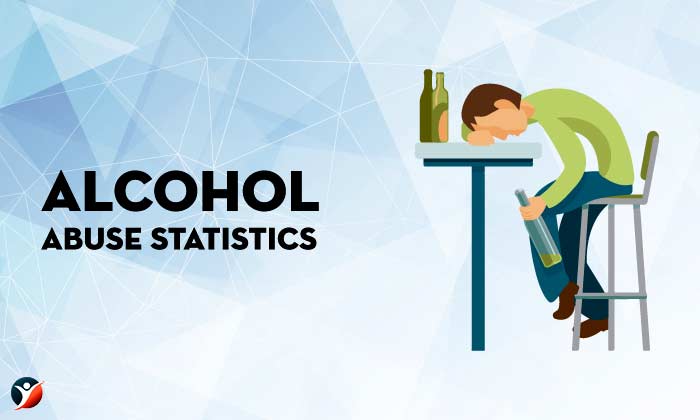
Signs and Symptoms of Alcohol Abuse
The signs and symptoms of the Alcohol Use Disorder or alcoholism include:
Psychological Symptoms or Mood Issues:
- The person consumes alcohol for longer duration of time or in much larger amounts than they wished to.
- The person wants to limit their alcohol use but always fails to do so.
- The individual spends too much time in accessing alcohol, consuming alcohol or recovering from alcohol consumption.
- The person almost always fails to fulfill their major responsibilities due to excess alcohol consumption.
- The person also recognizes that alcohol consumption is leading to or literally worsening their psychological or mood issues but they still continue to consume alcohol.
- Alcohol abuse in order to feel happy, enjoy, sleep, celebrate, relax, cope up with difficulties or just to feel a bit more “normal”.
Behavioral Symptoms:
- The person is no longer interested in taking part in any of the important activities due to alcohol abuse.
- Knowingly consumes alcohol when in dangerous situations or circumstances.
- Drinking alone to avoid judgments of others people especially family and friends.
Social Symptoms:
- Interpersonal issues due to alcohol abuse but he or she still refuses to limit the alcohol consumption.
- Fights frequently or has anger outbursts with no genuine trigger or cause.
- Social avoidance and staying away from people who don’t use alcohol.
Physical Symptoms:
- Extreme alcohol cravings
- The person very well recognizes that alcohol consumption is either causing or worsening their physical problems but they continue to consume it anyway
Tolerance Symptoms:
- The person needs significantly larger amounts of alcohol to to achieve desired feelings or become intoxicated.
- Considerably decreased effects from the similar amount of alcohol consumed.
Withdrawal Symptoms:
- Continuous alcohol abuse to prevent the withdrawal symptoms
- Negative psychological or physical effects due to limiting your alcohol use
Now that you know the classic signs and symptoms of alcohol abuse, lets get to the causes that may possibly lead to alcohol use disorder or alcoholism.
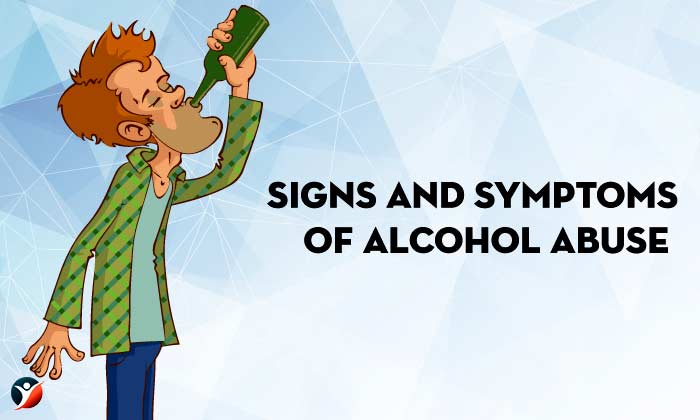
Causes Leading To Alcohol Abuse
A number of causes may lead to alcohol abuse. Let’s discuss a few factors that lead to the alcohol abuse below.
- Genetic Factors: Alcohol use actually runs in the families and people who have a close relative or parent with an alcohol use disorder (AUD) have a much larger likelihood of repeated alcohol abuse as compared to their peers. Additionally, unknown interactions of various genes are said to contribute to alcohol abuse.
- Relatively Smaller Brain Structures: Certain brain structures that are associated with controlling the cravings for alcohol and various other substances are found to be relatively smaller in the individuals who abuse alcohol as compared to others.
- Different Brain Chemistry: There is little research which suggests that people with alcohol related issues have a much higher level of circulating serotonin in their brains. Serotonin is a chemical which is primarily responsible for the neural communications. It is somehow related to the reduced levels of tolerance to the alcohol. This indicates that these people have a little time until they again develop the urge to increase the alcohol amount they consume to achieve the desired results.
- Your Temperament: Individuals who indulge in alcohol abuse are more prone to display lack of inhibition, and this is believed to be an innate temperamental quality. It is hypothesized that this causes an individuals to lack the integral warning system that warns them to stop drinking when they have had enough of alcohol.
- Life Stressors: One purported positive effect of alcohol is that it has a significant numbing effect on the emotions of an individual. Most of the people with alcohol abuse experience reduction in a large number of life stressors which they are otherwise unable to control. Alcohol might be used to significantly numb the negative emotions people feel are crushing them.
After discussing the causes, let us discuss the treatment options available for people struggling with alcohol abuse.
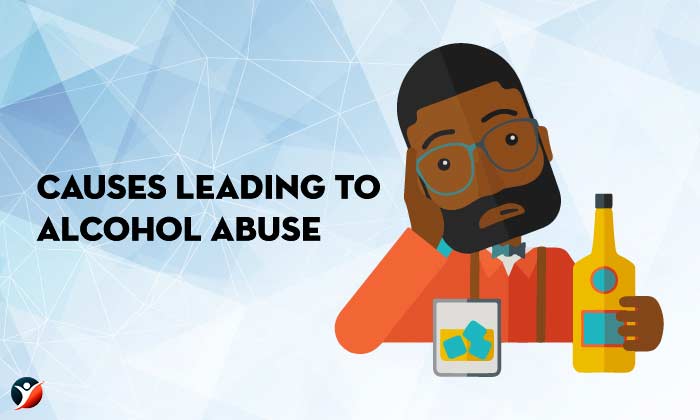
Treatments Available For Alcohol Abuse
The treatment option that is apt for you majorly depends on the situation and your aims. Most people with alcohol abuse believe that a combination of these treatments is best, and you may get all of them together through a program. Few treatments out of these are residential or inpatient programs, where you are made to stay at the treatment center for a duration. Others treatments include outpatient programs, wherein you can easily live at your home and visit the center for suitable treatment. Let’s discuss the treatment options available for the same.
1. Go For A Detox
People who are struggling with severe alcoholism or alcohol use disorder, must consider this as a primary step. Your goal would be to stop drinking alcohol and give your body sufficient time to eliminate alcohol from your system. This generally takes only few days to around one week. Most people might need to visit hospital or a treatment center due to painful withdrawal symptoms such as:
- Shaking or tremors
- Feeling or seeing things or people who are really not present there (hallucinations)
- Seizures
Doctors and other experienced physicians can recommend you medicines to alleviate your symptoms.
2. See a Therapist or Counselo
With alcohol abuse or alcohol use disorder, controlling your urge of drinking is just one part of the answer. You would also need to learn multiple skills and strategies to help you out of the habit. Social workers, psychologists or alcohol counselors may help you with the following:
- Changing the behaviors that makes you feel like drinking
- Deal positively with stress, depression and other similar triggers
- Building a very strong support system
- Set realistic goals and easily reach them
Few people require a focused and short counseling session. Others might require a one-on-one session for longer time to effectively deal with other psychological issues such as depression and anxiety. Alcohol at times also have a big effect on the people who are closest to you, so family or couples therapy may help you too.
3. Medications
No medicine can really treat alcohol abuse or alcoholism, but few medicines may help you recover early. These medicines can make drinking much less enjoyable such that you would not like to do it as much as you were:
- Disulfiram can make you feel sick or literally throw up if you are drinking.
- Acamprosate can significantly reduce the alcohol cravings.
- Naltrexone can block the high you get from alcohol consumption.
Drugs that are used for various other conditions such as pain, smoking or epilepsy may also help with your alcohol use disorder. Consult your doctor to know which one of those might be helpful for you.
4. Join a Support Group
A support group or a group therapy can help you significantly during the rehabilitation and this may help you stay right on track as your life gets back to its normal course.
Group therapy, that is led by an experienced therapist, can provide benefits of therapy along with support of others as in a support group.
Support groups, on the other hand, are not led by any therapist. Instead, they have groups of people who are also suffering from alcohol use disorder or alcohol abuse. For example SMART Recovery, Alcoholics Anonymous and various other programs. Your peers may offer you understanding and much needed advice to help you cope with the issues. Many people like to stay in groups as for several years.
5. Cognitive Behavioral Therapy (CBT)
Cognitive behavioral therapy (CBT) can take place either one on one with an experienced therapist or in several small groups. This type of therapy is basically focused at identifying the very feelings and circumstances (known as “cues”) that make a person indulge in heavy drinking or alcohol abuse. It also focuses at managing stress such that to prevent any relapse. Strong family support helps in alcohol abstinence as compared to the patients who undergo any individual counseling.
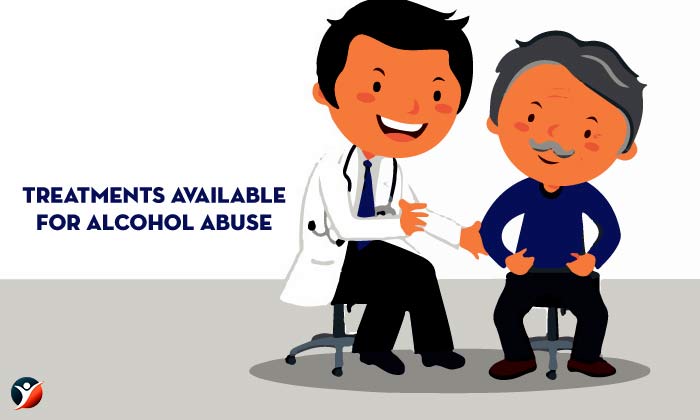
Conclusion
Recovery may take a longer time, so you might require an ongoing treatment. Few people under the recovery process do relapse and drink again. If you relapse, don’t think that you’ve failed. This is just a phase in the process, and your recovery may get easier. After five years, only one out of every seven people have drinking issues. Treatment works and quite well, you just need to give yourself some time.
Did you enjoy reading our article? Did you follow any of the recommendations given below. Keep checking this space out for more on alcohol abuse.





